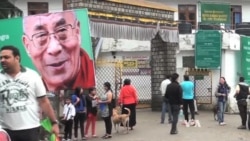A renewed push for autonomy by the Tibetan government in exile aims to reach out to Chinese scholars and civil society in the hope that they can influence the Chinese government to restart talks.
Whenever the political head of the Tibetan exile government Lobsang Sangay, leaves his headquarters in the Indian town Dharamsala for trips abroad, he says he often finds misunderstanding about what the Tibetan spiritual leader, the Dalai Lama, is seeking for his homeland.
Many people incorrectly think he wants Tibetan independence from China.
“We concluded that the misinformation was fed mainly by the Chinese government officials and those who are sympathetic to the Chinese government," said Sangay.
The Dalai Lama has long pursued autonomy for his Tibetan homeland, a path he calls the “Middle Way.”
Now the exile government is trying to correct misperceptions with a Middle Way awareness initiative — a campaign they are calling their most concerted push for Tibet’s autonomy.
Countering anti-Chinese stereotype
The head of the Tibet Policy Institute, Thubten Samphel, says the exile administration wants to educate Chinese people that the Tibetan political struggle is not anti-Chinese.
“They feel that it is the best possible way to resolve a very protracted issue," said Samphel. "It does not undermine the territorial integrity of the People’s Republic of China. So what we want is what people in Hong Kong want: free press, within a single administration, the ability to enjoy free speech."
In a tough response to the autonomy campaign, Chinese government spokesman Hong Lei denounced Tibetan leader Lobsang Sangay as a “100 percent separatist” and his exile government as illegitimate.
"It is a separatist organization which has its own agenda and guiding principles and is trying to separate Tibet from China," said Lei.
Beijing rejects talks with the exile government, but authorities in Dharamsala say informal channels of dialogue remain open through the steady stream of Chinese scholars and Buddhists who visit this scenic Himalayan town.
Tibetan exile Prime Minister Lobsang Sangay calls it a “bottom up” approach.
“So we hope that at a people’s level they have a better understanding of the issue of Tibet and through that impact the Chinese leaders to review their current policies, the heartland policies which is not working and then introduce more liberal policies towards Tibetan people," he said.
This approach could take a long time to have an impact. But Tibetans like Samphel say they are patient.
“We can wait, we Tibetans tend to reincarnate," said Samphel.
For a Tibetan political struggle now more than 50 years old, such spiritually-based patience has earned it many admirers abroad, but little influence on policies inside China.









